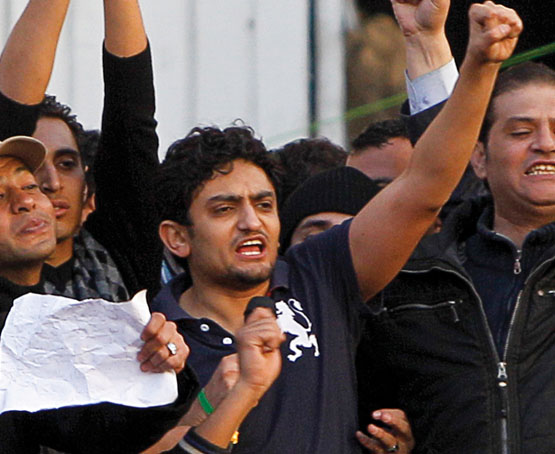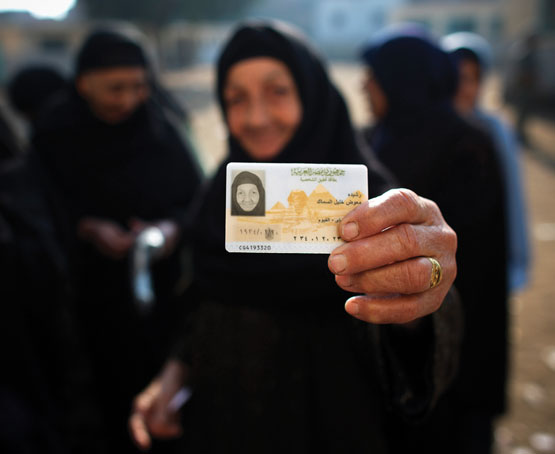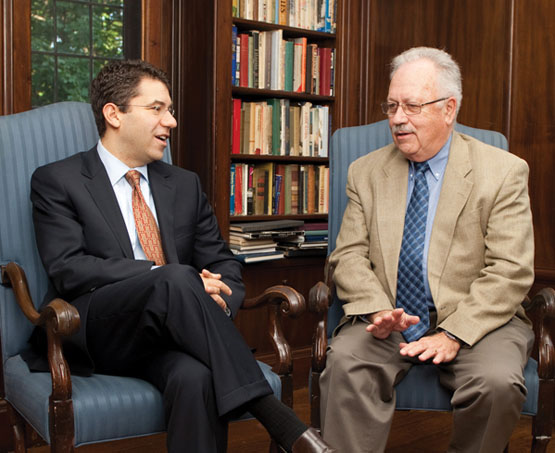The Egyptian Revolution: One Year Later

Steven Cook ’90, the Hasib J. Sabbagh Senior Fellow for Middle Eastern Studies at the Council on Foreign Relations (CFR), is a leading expert on Arab and Turkish politics and U.S.-Middle East policy. He is the author of several books on the region, including Ruling but Not Governing: The Military and Political Development in Egypt, Algeria, and Turkey and, most recently, The Struggle for Egypt: From Nasser to Tahrir Square.
Fluent in Arabic, Cook splits his time between Washington, DC, and the Middle East, particularly Egypt. He spent several days in Tahrir Square during the Egyptian revolution in early 2011. This past fall, he shared his observations with Vassar students in the lecture “Upheaval and Change: U.S. Policy in the New Middle East.” In the conversation below, Cook and his mentor, Professor Emeritus of Political Science Glen Johnson, talk about what the implications of the Egyptian uprising might be as events continue to evolve in the region.
Glen Johnson: Americans have been very concerned about Egypt, partly in response to what the Mubarak regime had said all along—that if Mubarak fell, Islamists would run the show.
Steven Cook: Yes, Americans are haunted by the specter of the Iranian revolution in 1979. When I was a sophomore at Vassar, almost 10 years after the revolution, I took a course on Iranian politics, and emotions were still raw over it. Once, we had to stop the class and everybody had to talk about this.
Egypt is the biggest Arab country. One in four Arabs is Egyptian. It is the most culturally, politically, economically influential country. Even though it doesn’t have the biggest economy in the region, it plays the greatest role in the global economy because it sits on the Suez Canal. So the possibility that we might be seeing this again in Egypt—a country of enormous strategic importance to the United States, a country friendly to the United States, that’s at peace with Israel—is of enormous concern.
It is clear that the Muslim Brotherhood is going to have an important role in the future of the country. They’ll have an influence on the constitution writing that is to come in Egypt, but I don’t think that they’re going to sweep these elections. I think there will be a rough balance of forces in the parliament. At least that’s what the military’s aiming for. But let’s face facts. In Egypt, the Muslim Brotherhood is prestigious and it has used its status as an effective social movement as a mechanism of political mobilization.
GJ: The Brotherhood also performs a lot of functions that governments usually perform—delivery of services and that sort of thing.
SC: That’s exactly right. In fact, the Mubarak government essentially outsourced a lot of the functions—health care, education, and a whole host of things—to the Muslim Brotherhood. It would crack down on the Brotherhood if they accumulated too much power, but there was a kind of accommodation between them. If that kind of thing could happen in an authoritarian system, then there’s no question that the Brotherhood, after years and years of providing these social services and being politically active, will also be important in a more open system.
The Brotherhood is having its own troubles adjusting to this more open system. There’s kind of an intellectual crisis about how to approach this new era. There are older members who cling to a more traditional approach of Islamizing society from below. Then there are the active younger members who want to be absolutely engaged in politics. They’ve broken away. In this more open environment, a lot of the younger brothers don’t want to submit to what they see as the authoritarian pol-
itics of the Brotherhood.
GJ: What implications does this kind of influence have for American policy in Egypt?
SC: Americans are going to have to get used to the fact that there are Islamist political parties that are going to be influential even in more open political systems and that the ability to rely on predictable, stable authoritarians to help us achieve our interests in the Middle East is over. Even in Egypt, the military or some other figure may reconstitute some type of authoritarian political system and it’s not going to be friendly to the United States, given our 30 years of close alignment with Mubarak. Islamists are also going to play a role in Tunisia and Libya. They will likely play a role in Syria, once the Assad regime comes down—if it comes down. It’s a brand-new Middle East, and forces not friendly to the United States are likely to come to power through the ballot box.
I saw the uprising in Egypt as the continuation of a nationalist drama that’s been playing out in Egypt for almost a century or more. Part of the revolutionary narrative is that Mubarak’s close relations with the United States had warped Egyptian foreign policy and rendered Egypt, which had been a regional power and a very important member of the non-aligned movement, a second-rate lackey of the United States. I don’t think any Egyptian politicians are going to make that mistake now. And having witnessed what happened in Egypt, neither will politicians in places where there hasn’t been an uprising; their leaders are not going to be so quick to help us achieve our objectives.
Yet our interests remain—the free flow of oil, helping to ensure Israeli security, making sure no one country dominates the region. We need creative policy makers and creative outsiders to help us figure out how to manage relations with countries in which new political systems are going to emerge.

GJ: When you lectured at Vassar this past fall, you seemed to minimize the likelihood that the military will want to retain power. I wanted to ask you about that, because it seems to me that the military in Egypt has become so integral to everything that goes on, to the whole economy, to the structure of everything, and they have, in essence, exercised a kind of underlying power, sometimes overt power, ever since the 1952 revolution. As time goes on, it seems to me they are going to feel that they cannot tolerate any sort of changes that will threaten that part of their position. And if that’s true, I can well imagine a scenario in which they ultimately will feel that they have to protect their own position. So I’ve tended to think that the military is, in some ways, the bigger threat to democratization, than, say, the Muslim Brotherhood.
SC: Well, that puts you in the camp of the revolutionary groups, which clearly identify the military as a counter-revolutionary force. And I don’t disagree that the military is a counter-revolutionary force, but I don’t think that the military wants to hold on to power. I believe they have a strategy to hand over power and to protect their interests. There’s a narrative that has become engrained in the socialization of the Egyptian armed forces. Between the 1952 coup d’état that brought Gamal Abdel Nasser and the Free Officers to power, and the June 1967 war, the military was directly involved in the day-to-day governance of and the politics of Egypt. That was one of the primary reasons why the Egyptians were beaten so badly in the June 1967 war with Israel. The Egyptian military had never reached the proficiency of a professional armed force. In the aftermath of that defeat, they pulled back from politics and trained, professionalized.
Six years later, they were able to accomplish Egypt’s greatest modern military achievement, the crossing of the Suez Canal in October 1968, which nobody believed they could possibly do. That’s what they carry with them—that they returned to the barracks a professional fighting force. They don’t want to be exposed to the vicissitudes of brutal, Egyptian politics. Even under an authoritarian system it was brutal. So I think they are trying to negotiate an exit from that day-to-day governance and protect their vast economic and political interests much in the way that Turkey’s military has done for many years, where the military plays a kind of guardian role, so that they can retain privileges.
GJ: Do you think they’ll be able to do that?
SC: There are many similarities, but I think there are some things the Egyptians don’t have that the Turks had. For example, they would need to be more directly involved in this constitution-writing process that’s going to unfold than they intend to be. The Turkish military essentially told a few people to write a constitution for them and told them what they wanted to be in it. I don’t think that the Egyptians have any intention to do that, and I don’t think politically they can do it. Also, in Turkey the military had a tremendous amount of support among the political class. I think the military in Egypt has a tremendous amount of support, but it doesn’t have elite support, and over the long term they’re not likely to have it. Finally, they need to believe in something. The Turkish military was committed in profound ways to Kemalist ideology, which emphasizes government control over religion (often misunderstood as secularism), Republicanism, and a radical nationalism. Far be it from me to understand what ideologically the Egyptian military believes in, other than stability and social cohesion, but, nevertheless, they’re going to try by hook or by crook to reestablish a kind of role for themselves where they rule but they don’t have to govern.
What’s happening in Egypt right now—and I talk about it in my book, The Struggle for Egypt—is that there are competing legitimacies. The military wants to retain its legitimacy as the expression of the Egyptian state, but the revolutionaries in Tahrir Square say, “No, no, we’re in a different era now. We represent the legitimacy and the promise of Tahrir Square. The military represents a discredited regime,” and then you have the Islamists who say that the new Egypt’s legitimacy rests in a more religious-oriented type of system. Egyptians are going to have to work all these things out and it’s going to take a long time.

GJ: How would you evaluate American media coverage of the uprising?
SC: It was uneven at best. There were some Western journalists who really nailed this from the beginning. Ben Wedeman from CNN, who’s been in the Middle East forever and speaks Arabic beautifully, said on the first day, “This is game over.” He did some intrepid reporting from Tahrir Square.
The first few days, I sensed that the media was mildly interested in what was happening—I was fielding some phone calls from CNN International and Bloomberg [News]. But once things got really tough on the Day of Rage, and everybody was actually turning to Al Jazeera for the news, then you had a surge in CNN coverage, big network coverage, where people were reporting from the Semiramis Hotel that overlooks the square. But many were hamstrung because they didn’t really know Egypt. They just dropped in to report on it.
There were also a few tics that the American media had that I thought were beside the point, like the focus on new technologies. They were constantly asking, “Is this the Twitter Revolution? Is this the Facebook Revolution?” These outlets certainly gave impetus to the movement and helped the instigators of the uprising organize, but the regime in Egypt eventually brought the Internet down.
The other hang-up was why there weren’t more women in Tahrir Square. In the beginning, there were many, many women, and a good number were at the forefront of the organizations that instigated the revolution. They were on Al Jazeera constantly. But it is true that there weren’t as many women there toward the end because of the awful and disgusting tactic that Egypt’s security forces have used for the better part of the last decade—to sexually assault Egyptian women, particularly Egyptian female journalists, in the midst of these protests.
But overall, I think you can applaud the media for recognizing a really big story in a country that hadn’t gotten a lot of coverage.
GJ: How do you think the American government performed?
SC: Well, I have two answers to that. How would you grade the Obama administration’s handling of this, and can you attribute this to George Bush’s freedom agenda? My answer is: It doesn’t matter, and unlikely. I think that they were a bit behind the curve, and you can’t really criticize them for that. Very, very few people were ahead of the curve. The government, their principals, and their advisers were getting advice and expert analysis from all around. But what I was hearing and seeing and sensing in Tahrir Square couldn’t possibly be what they were feeling, hearing, and sensing in the White House or State Department, the Defense Department, or even the CIA.
Let’s face it. It was hard. We had a 30-year relationship with Mubarak, so the government had to walk a tightrope: What if he prevailed? If the president had come out in the first few days and said that Mubarak had to step down, what kind of relationship would we have had afterward? But we also wanted to demonstrate support for the demands in Tahrir. So there was that fine line.
I think once Washington understood what was happening they did a better job, but there were funny juxtapositions. I remember being in my hotel room at 3:30 or 4 o’clock in the morning, watching Al Jazeera Arabic. There had just been a State of the Union address by Obama and they were praising what he had said about Tunisia. Egypt didn’t come up. But when I switched to Al Jazeera English, they had footage of State Department spokesman P. J. Crowley saying, “Egypt is stable.”

GJ: The Egyptian economy is in terrible shape and heavily dependent on American aid. But the aid program is under attack for both political and economic reasons. What do you think is the future of U.S. aid there?
SC: I think the $1.3 billion a year in military aid we’ve been contributing to Egypt since 1983 will likely continue for the foreseeable future. We’re reluctant to use that aid in a way to beat the Egyptians up, and the military in the United States supports that aid. In this economic climate, big aid programs are seen as problematic, but I think it would be a mistake to stop it. Egypt, in particular, is too big to fail.
GJ: I remember being told by a regional vice president for a bank in Cairo when I was there that the American aid program had been extremely damaging to the Egyptian economy, that Egypt had been given just enough to keep it afloat and help it avoid the serious reform it needed to undertake.
SC: This has been a perennial problem, but because Egypt is strategically important not just to the United States, but to Europeans, it has what social scientists call “soft budget constraints.” It’s a pretty leaky boat, but people will try to keep it afloat. Someone’s always going to ride to the rescue.
Glen Johnson is professor emeritus of political science at Vassar, where he served as the Shirley Ecker Boskey Professor of Political Science and International Relations. He was the founding director of the International Studies Program and was twice acting president during President Fergusson’s sabbaticals. After retiring from Vassar, he spent two years as distinguished visiting professor at the American University in Cairo, Egypt.
